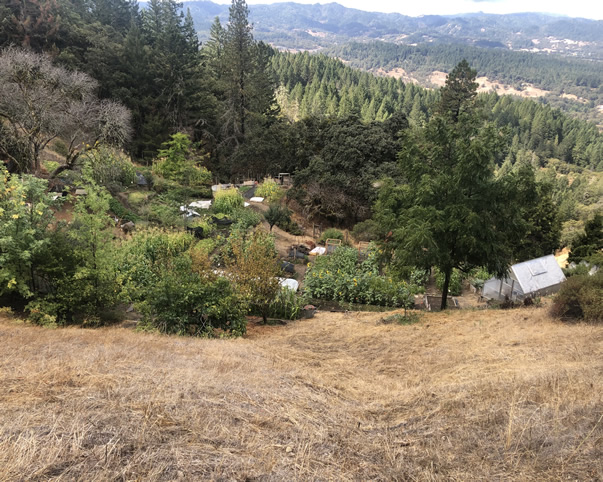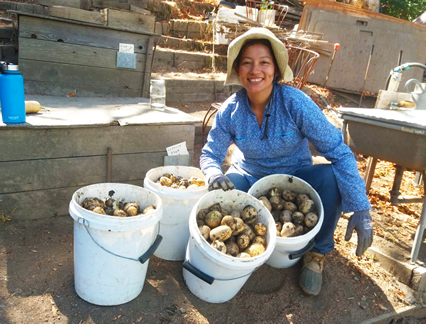The Jeavons Center Mini-Farm Report
Since the beginning of January, The Jeavons Center (TJC) Mini-Farm Manager Misha Zaied and I have been focused on re-growing TJC Mini-Farm, which had been in hibernation for over a year due to financial constraints. Now, with significant funding from the Ceres Trust for general program support and scholarships, plus generous financial support from the Warsh-Mott Legacy Foundation, Dr. Bronner's Soapmakers, the Edna Wardlaw Trust, the Caroll Petrie Foundation and of course our wonderful Ecology Action Members—plus knowing we had an excellent group of interns coming for the season—we were able to begin work with confidence. Although work was slowed by a cooler than usual May, June and July; less dynamic compost stored for some time, and deer defeating our over 35-year-old fence, we've made progress. As we persevere, beautiful potatoes, corn and other crops are thriving! The process of reawakening the mini-farm will take two years as we rebuild optimal soil fertility and develop an experienced Farmer-Leader Trainer and Administrative Staff with organizational continuity to best serve the increasing number of countries and people who benefit from our work. GROW BIOINTENSIVE (GB) is successfully used in 153 of the world's 195 countries—in virtually all the soils and climates where food is grown. The GB Farmer-Leader Trainer Teams at TJC and VGFP and those using GB around the world are backed up by a great Administrative Team: Laurie Birch: Executive Assistant to the Director, Data Manager and Librarian; Lori Leudemann: Office Manager and Bookkeeper; Jennifer Bixler: Newsletter Tonal Editor; David Troxell: Communications Director; Carol Cox: Copy-Editor and Advisor; and Shannon Joyner: Newsletter Editor, Webmaster, Wordsmith and Graphic Designer. Over the winter, Misha and I designed a 10-Bed Unit (10BU) with 1,000 square feet of planted surface that can grow a complete balanced diet for one person annually and, with the same crops, all the necessary compost materials to build and maintain soil fertility. I provided the approach and guidelines, and Misha did all the work of creating the 10BU adapted to our climate and soil and to his dietary preferences. Misha came up with a great design. (It helped that, in addition to having a good mind, perspective and sensitivities, he had a college focus in computer science!) With the design complete, we decided that Misha, the Assistant Mini-Farm Manager, and our three 8-month interns would each plant out this plan. The goal is to have several 10BUs growing at TJC Mini-Farm with the same design, but in different micro-climate areas and soils. (Unfortunately, in June, Misha became ill and decided that dedicating his full attention to healing was the best course of action. We were all sad to see him leave Ecology Action, but glad that he will be focused on healing and sustaining his well-being.) Our 8-month interns started their season in April. From Nicaragua, we welcomed Ana Lucia Cantillano, a successful videographer and community leader; and Marcia Suarez, who established two successful GB sites in Nicaragua in connection with the international NGO Blue Energy Group; and from Kenya, Fredrick Onyango, Lead Teacher from Ecology Action's International Partner for Africa, G-BIACK. Each intern is responsible for establishing and tending a 10BU, plus four additional growing beds of their own design, for a total of 14 beds each, and for maintaining many of the other 110 TJC growing bed equivalents to build and maintain fertility, grow compost crops and create compost. Interns also arrived at Victory Gardens for Peace located at Stanford Inn Historic Farm and Eco-Resort (stanfordinn.com) in Mendocino, CA: Camila Guerrero from Chile, who plans to develop a GB site of her own; Ariel Pinto from Chile, who plans to establish an organic school garden, combining Mapuche and Biointensive cultivation techniques; and Elena Torres from Puerto Rico, who completed her studies with us in August to pursue an independent research project in sustainable agriculture through the Fulbright U.S. Student Program in Brazil. Thanks to our funders, we are able to provide funding up to $6,000 per project to support selected GB demonstration and outreach initiatives created by some of Ecology Action's 2019 8-Month Interns.
Ike Enahoro, from the US, joined us as a 3-Year Apprentice in June. Ike is the son of Agaja Enahoro, a Senior Apprentice at Alan Chadwick's last Virginia site; Ike met Alan when he was just five! Ike graduated from Cornell University with a degree in Asian studies. After college, his activities included time in the Army and recently a master's degree in theology to round out his education and life experiences. Ike is impressed by how energetically our interns work, while keeping up with their reading and mini-farm design homework. In April, our terrific team was joined by Melvin Castrillo, first as Assistant Mini-Farm Manager, and following Misha's departure, as Mini-Farm Manager. Born in Nicaragua, now a US citizen, at 52 Melvin brings with him life experiences in two countries, an agricultural background, plus a talent for working well with people and finding practical solutions to challenges. He is bilingual, and frequently assists in translating at TJC. We are living in a time of increasing global concern about the rapid depletion of Even more hopeful, GB has the potential, if all the farms in the world were put into Biointensive production, to reduce atmospheric CO2 levels by 50%, and very possibly much more, due to dramatic carbon sequestration in the soil and in the increased number of plants grown per unit of area and time. This may sound like a tall order when you think about huge factory farming operations, but remember: 70% of the world's food is grown on small farms of 2 acres or less—these are the farms that can help save the world by implementing GB and improving yields with less resource consumption! Ecology Action Director John Jeavons presented Food for the Future: Now in September at the Soil Not Oil Conference in San Francisco, CA, and at the Heirloom Seed Expo in Santa Rosa, CA. Both lectures were well-attended, and good questions from the audience led to a better understanding of the importance of growing food, soil and oneself as the World's Most Important Resources! ECOPOL Director Juan Manuel Martinez made his first trip to Chile at the end of 2018, completing his goal of establishing 5 core GB hubs throughout Latin America, north to south. The whirlwind, 4-week tour through Chile included 4 workshops, 3 conferences and a seminar, 6 talks, and visits to 13 garden sites. Juan reports that Chile is ripe with Biointensivistas; 17 people are participating in teacher certification workshops there this fall, and many communities and schools are setting up GB gardens! top | Newsletter Home |Table of Contents| Archive
|



 farmable soil, limited water supplies, peak oil, and peak farming nutrient availability—not to mention global climate disruption. It can all be a bit much to contemplate, but don't despair!! Soil- and Food-Growing, Closed-Loop, Sustainable GROW BIOINTENSIVE® Mini-Farming can build soil 60 times faster than in nature, while producing high yields, and requiring just 33% the water, 0-50% the purchased fertilizers and 6% the energy per pound of food produced, as compared with conventional farming.
farmable soil, limited water supplies, peak oil, and peak farming nutrient availability—not to mention global climate disruption. It can all be a bit much to contemplate, but don't despair!! Soil- and Food-Growing, Closed-Loop, Sustainable GROW BIOINTENSIVE® Mini-Farming can build soil 60 times faster than in nature, while producing high yields, and requiring just 33% the water, 0-50% the purchased fertilizers and 6% the energy per pound of food produced, as compared with conventional farming. 